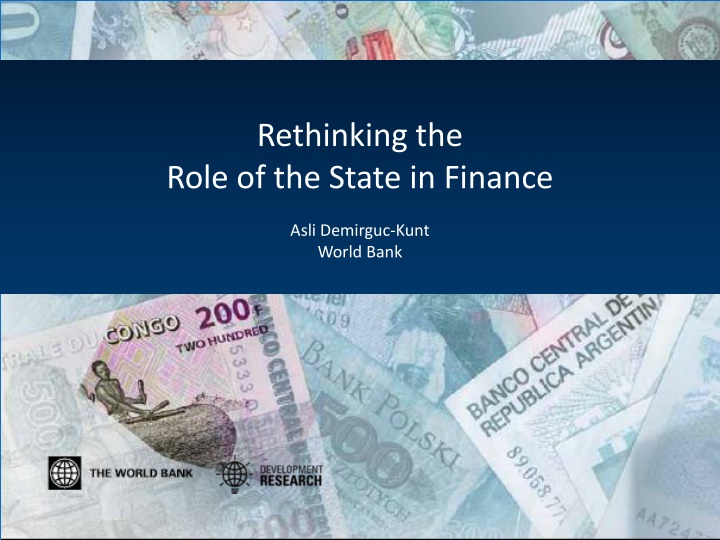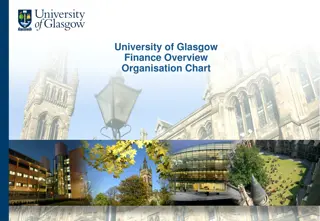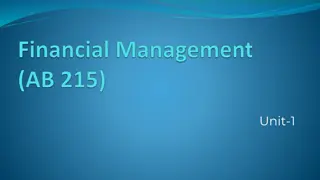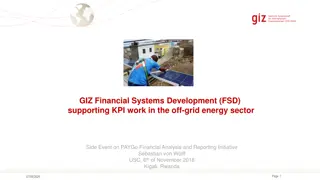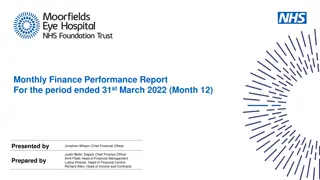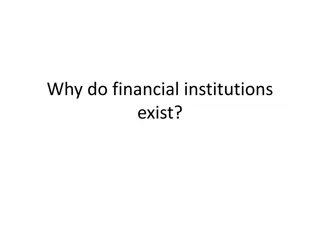Rethinking the Role of the State in Finance: Insights from Global Financial Development Report
Asli Demirguc-Kunt, in collaboration with the World Bank, presents a thought-provoking analysis on the evolving role of the state in finance post the global financial crisis. The report delves into the necessity of reevaluating regulatory frameworks, competition policies, state interventions, and infrastructure to ensure financial stability, growth, and job creation. Expert opinions from the Financial Development Barometer shed light on the varying perspectives regarding the state's involvement in the financial sector.
Download Presentation

Please find below an Image/Link to download the presentation.
The content on the website is provided AS IS for your information and personal use only. It may not be sold, licensed, or shared on other websites without obtaining consent from the author.If you encounter any issues during the download, it is possible that the publisher has removed the file from their server.
You are allowed to download the files provided on this website for personal or commercial use, subject to the condition that they are used lawfully. All files are the property of their respective owners.
The content on the website is provided AS IS for your information and personal use only. It may not be sold, licensed, or shared on other websites without obtaining consent from the author.
E N D
Presentation Transcript
Rethinking the Role of the State in Finance Asli Demirguc-Kunt World Bank
Intro Regulation and Supervision Competition Policy Direct Interventions Infrastructure Main Messages Global Financial Development Report First in a series, motivated by the global financial crisis Combines new data, research, lessons from operational work Collaboration within WBG and with external contributors The Crisis Questioned the validity of our policy advice in the financial sector Certainly reviving the notion of a bigger role for the state; in state interventions helping stability, Growth and jobs Source: AFP More than a report Accompanied by Global Financial Development Database and several other major databases and surveys, benchmarking of financial systems around the world, a range of underlying case studies and research papers http://www.worldbank.org/financialdevelopment Source: AFP
Intro Regulation and Supervision Competition Policy Direct Interventions Infrastructure Main Messages Expert views: Financial Development Barometer Over 90 % of respondents think that positive effects of financial development outweigh the negative ones. But views are split on important aspects of the state s role . Examples of statements where opinions were split Agree? "In view of the global financial crisis, more stringent financial sector regulation and supervision is needed." 49 % "In view of the global financial crisis, there is a need for broadening the scope of financial sector regulation and supervision." 54 % "More financial sector competition would help financial stability in my home country." 58 % State-owned financial institutions played an effective counter-cyclical role during the recent global financial crisis." 48 % Government-backed credit guarantee schemes play an important role in promoting financial stability." 64 % The development of collateral registries can be left, fully or mostly, to the private sector. 42 % Source: Financial Development Barometer 2011 (http://www.worldbank.org/financialdevelopment). The Barometer is an informal global poll of officials and financial sector experts from 78 economies (30 percent developed, 70 percent developing). The response rate was 65 percent. Results are percentages of total responses received.
Intro Regulation and Supervision Competition Policy Direct Interventions Infrastructure Main Messages Lessons from the Crisis Given diverse expert views and pressures to reform, there is always a significant risk of drawing the wrong lessons from the crisis Hence the report and the underlying research intends to take a step back and re-evaluate (i) what we knew before the crisis, (ii) what the crisis thought us, and (iii) where we go from here In the following areas concerning the role of the state: 1. Regulation and Supervision 2. Competition Policy in Banking 3. Direct State Interventions; particularly state ownership of banks 4. Improving information infrastructure
Intro Regulation and Supervision Competition Policy Direct Interventions Infrastructure Main Messages State as regulator and supervisor Area where role of state undisputed Crisis: major shortcomings in market discipline and R&S How to best ensure that R&S supports sound financial development? Important trade-offs (too much/too little R&S) Calls for not more , but for right type of regulation New WB survey of R&S in 142 countries allows us to investigate two issues and shed new light: How does R&S and market discipline compare in crisis-hit countries relative to the rest? How did R&S and market discipline change since the crisis?
Intro Regulation and Supervision Competition Policy Direct Interventions Infrastructure Main Messages State as regulator and supervisor
Intro Regulation and Supervision Competition Policy Direct Interventions Infrastructure Main Messages Findings on regulation and supervision Crisis hit countries had weaker regulation and supervision practices (e.g., less stringent capital and provisioning rules, reliance on banks own risk assessment) and less scope for market incentives (e.g., generous deposit protection coverage, lower quality of published financial information) After crisis, countries stepped up efforts on macroprudential policy, crisis resolution, and consumer protection However, unclear whether incentives for market discipline improved Survey suggests scope for improving disclosures and monitoring incentives Broad agreement: important to address basics first Simpler but strongly enforced regulation tends to work better Institutional and legal frameworks that enable market discipline complemented with strong and timely supervisory action Many developing economies: supervisory capacity = top priority Challenge: introducing reforms that are incentive-robust (one proposal: incentive audits )
Intro Regulation and Supervision Competition Policy Direct Interventions Infrastructure Main Messages Incentive Audits as a tool Special focus on the importance of incentives For example, instead of solely focusing on auditing Basel core principles.. (which research has shown not be significantly associated with stability outcomes) ..conduct incentive audits to identify misaligned incentives Regularly and systemically evaluate structural factors that affect incentives for risk-taking in the financial sector Cover guarantees, safety nets, banking powers, relationships, structure of ownership and liabilities, contract design, tax incentives To eliminate risk at source Implementation Monitoring and policy response could be organized under the macroprudential authority Policy instruments needed are much broader than microprudential instruments Organizing principle, need not be developed from scratch; for eg. can be incorporated into FSAPs more systematically. Source: Cihak, Demirguc-Kunt and Johnston, 2013, Incentive Audits: A New Approach to Financial Regulation.
Intro Regulation and Supervision Competition Policy Direct Interventions Infrastructure Main Messages Role of state in promoting competition Was excessive competition in banking the culprit? Literature prior to the crisis suggests Competition is associated with greater efficiency, and greater access But evidence of the impact of competition on stability is somewhat mixed. Did too much competition lead to the crisis? If so, is the right policy for the state to restrict competition?
Intro Regulation and Supervision Competition Policy Direct Interventions Infrastructure Main Messages Role of state in promoting competition New research evidence looking at systemic risk (as opposed to individual bank risk) shows that market power and systemic risk increased hand in hand before the crisis Hence competition leads to improved efficiency across banks, enhances access to financial services while not necessarily eroding systemic stability. Addressing causes of the crisis requires regulations that align private incentives and public interest (not restricting competition) Role for the state: market contestability (healthy entry and exit) and availability of credit information and contract enforcement are important to promote healthy competition. Governments should eliminate distortions in risk-taking (e.g., too-big-to fail subsidies) to limit negative consequences on bank competition.
Intro Regulation and Supervision Competition Policy Direct Interventions Infrastructure Main Messages Direct state interventions Crisis re-ignited the debate on the role of state owned banks Is the counter-cyclical role of state-owned banks in offsetting credit contractions justification enough? Pros: additional tool for crisis management in the short term Cons: misallocation and efficiency losses due to politically-motivated lending Array of strategies to restart the financial and real sectors Lending to private sector by state-owned banks Commercial banks: Banco de Estado (Chile), PKO Bank Polski (Poland) Development banks: BNDES (Brazil), China Development Bank Credit guarantees Mexico Unconventional monetary policies QE and credit policies by central banks (advanced economies)
Intro Regulation and Supervision Competition Policy Direct Interventions Infrastructure Main Messages Direct state interventions New evidence State-owned bank lending tends to be less pro-cyclical, and in some countries banks played a short-run counter-cyclical role (ECA vs. LAC) But loans were not directed to the most constrained borrowers and lending growth by state continued even after recovery. Trade-offs Governments need to consider benefits of counter- cyclical lending vs. long-term costs on credit allocation Past evidence on longer-term costs question the wisdom of such policies Need to address inefficiencies of state-owned banks Clear and sustainable mandate Adequate risk management systems Sound corporate governance But good governance practices are challenging to implement in weak institutional environments.
Intro Regulation and Supervision Competition Policy Direct Interventions Infrastructure Main Messages Credit information sharing: some new results Important role of the state promote participation, ensure access and transparency particularly in concentrated environments; private information sharing is less likely to emerge when banking systems are concentrated; state also has a role in increasing participation beyond banks to non-banks 1.0 Low bank concentration High bank concentration 0.92 Probability of existence of a credit 0.9 0.8 0.8 reporting system 0.7 0.56 0.6 0.53 0.5 0.39 0.37 0.4 0.3 0.2 0.1 0.0 Credit Registry Credit Bureau Any Credit Reporting Note: The figure shows the percentage of countries with private (credit bureau), public (credit registry) or any credit reporting institutions for countries with high and low bank concentration (above and below the sample mean), respectively. It shows that bank concentration (the asset share of a country s three largest banks) is negatively associated with development of credit reporting. Source: Based on Bruhn, Farazi, and Kanz (2012).
Intro Regulation and Supervision Competition Policy Direct Interventions Infrastructure Main Messages Main messages Needed: balance among the state s roles Promoter / owner and guarantor / regulator and supervisor / overseer Right balance depends on a number of factors, including the level of development and the government s capacity. This leads to trade-offs. Direct interventions during the crisis: Evidence that some worked partly, in the short run . . but also robust evidence on potential longer-term harmful effects as crisis subsides, need for rebalancing towards less direct involvement Overarching theme: role of incentives in finance the challenge for the state's involvement is to better align private incentives with public interest without taxing or subsidizing private risk-taking
